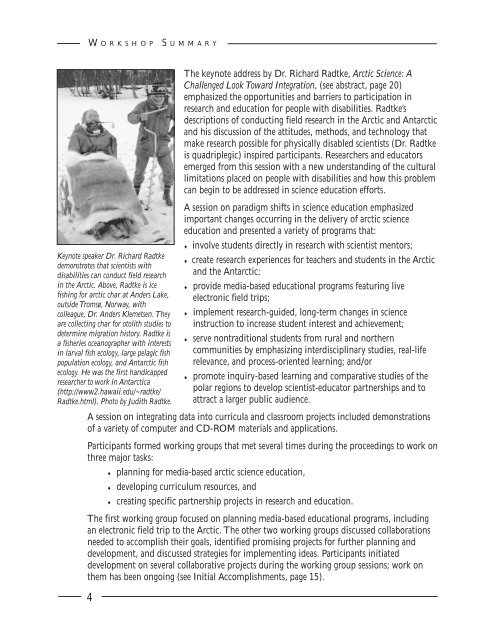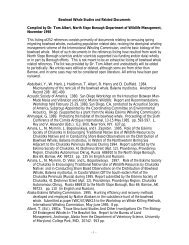ed report 4 page cover - Arctic Research Consortium of the United ...
ed report 4 page cover - Arctic Research Consortium of the United ...
ed report 4 page cover - Arctic Research Consortium of the United ...
Create successful ePaper yourself
Turn your PDF publications into a flip-book with our unique Google optimized e-Paper software.
W O R K S H O P S U M M A R Y<br />
Keynote speaker Dr. Richard Radtke<br />
demonstrates that scientists with<br />
disabilities can conduct field research<br />
in <strong>the</strong> <strong>Arctic</strong>. Above, Radtke is ice<br />
fishing for arctic char at Anders Lake,<br />
outside Tromsø, Norway, with<br />
colleague, Dr. Anders Klemetsen. They<br />
are collecting char for otolith studies to<br />
determine migration history. Radtke is<br />
a fisheries oceanographer with interests<br />
in larval fish ecology, large pelagic fish<br />
population ecology, and Antarctic fish<br />
ecology. He was <strong>the</strong> first handicapp<strong>ed</strong><br />
researcher to work in Antarctica<br />
(http://www2.hawaii.<strong>ed</strong>u/~radtke/<br />
Radtke.html). Photo by Judith Radtke.<br />
4<br />
The keynote address by Dr. Richard Radtke, <strong>Arctic</strong> Science: A<br />
Challeng<strong>ed</strong> Look Toward Integration, (see abstract, <strong>page</strong> 20)<br />
emphasiz<strong>ed</strong> <strong>the</strong> opportunities and barriers to participation in<br />
research and <strong>ed</strong>ucation for people with disabilities. Radtke’s<br />
descriptions <strong>of</strong> conducting field research in <strong>the</strong> <strong>Arctic</strong> and Antarctic<br />
and his discussion <strong>of</strong> <strong>the</strong> attitudes, methods, and technology that<br />
make research possible for physically disabl<strong>ed</strong> scientists (Dr. Radtke<br />
is quadriplegic) inspir<strong>ed</strong> participants. <strong>Research</strong>ers and <strong>ed</strong>ucators<br />
emerg<strong>ed</strong> from this session with a new understanding <strong>of</strong> <strong>the</strong> cultural<br />
limitations plac<strong>ed</strong> on people with disabilities and how this problem<br />
can begin to be address<strong>ed</strong> in science <strong>ed</strong>ucation efforts.<br />
A session on paradigm shifts in science <strong>ed</strong>ucation emphasiz<strong>ed</strong><br />
important changes occurring in <strong>the</strong> delivery <strong>of</strong> arctic science<br />
<strong>ed</strong>ucation and present<strong>ed</strong> a variety <strong>of</strong> programs that:<br />
♦ involve students directly in research with scientist mentors;<br />
♦ create research experiences for teachers and students in <strong>the</strong> <strong>Arctic</strong><br />
and <strong>the</strong> Antarctic;<br />
♦ provide m<strong>ed</strong>ia-bas<strong>ed</strong> <strong>ed</strong>ucational programs featuring live<br />
electronic field trips;<br />
♦ implement research-guid<strong>ed</strong>, long-term changes in science<br />
instruction to increase student interest and achievement;<br />
♦ serve nontraditional students from rural and nor<strong>the</strong>rn<br />
communities by emphasizing interdisciplinary studies, real-life<br />
relevance, and process-orient<strong>ed</strong> learning; and/or<br />
♦ promote inquiry-bas<strong>ed</strong> learning and comparative studies <strong>of</strong> <strong>the</strong><br />
polar regions to develop scientist-<strong>ed</strong>ucator partnerships and to<br />
attract a larger public audience.<br />
A session on integrating data into curricula and classroom projects includ<strong>ed</strong> demonstrations<br />
<strong>of</strong> a variety <strong>of</strong> computer and CD-ROM materials and applications.<br />
Participants form<strong>ed</strong> working groups that met several times during <strong>the</strong> proce<strong>ed</strong>ings to work on<br />
three major tasks:<br />
♦ planning for m<strong>ed</strong>ia-bas<strong>ed</strong> arctic science <strong>ed</strong>ucation,<br />
♦ developing curriculum resources, and<br />
♦ creating specific partnership projects in research and <strong>ed</strong>ucation.<br />
The first working group focus<strong>ed</strong> on planning m<strong>ed</strong>ia-bas<strong>ed</strong> <strong>ed</strong>ucational programs, including<br />
an electronic field trip to <strong>the</strong> <strong>Arctic</strong>. The o<strong>the</strong>r two working groups discuss<strong>ed</strong> collaborations<br />
ne<strong>ed</strong><strong>ed</strong> to accomplish <strong>the</strong>ir goals, identifi<strong>ed</strong> promising projects for fur<strong>the</strong>r planning and<br />
development, and discuss<strong>ed</strong> strategies for implementing ideas. Participants initiat<strong>ed</strong><br />
development on several collaborative projects during <strong>the</strong> working group sessions; work on<br />
<strong>the</strong>m has been ongoing (see Initial Accomplishments, <strong>page</strong> 15).




